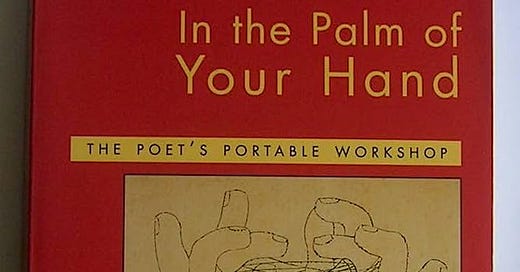Book Recommendation #In the Palm of Your Hand by Steve Kowit
Catching up on books I've been meaning to read for ages!
Over the past few years, I have grown particularly fond of poetry handbooks. Because I am always consciously or unconsciously perusing books I want (and damn, there are so many I need in my life), I will always come across another intriguing handbook that I cannot resist. Right now, I have seven, three of which I have yet to read, and I am in no rush because they need to be utterly savoured, they really do. Plus, I’m halfway through a Shirley Jackson I want to finish. These dark rainy days always get me in the mood for gothica. That said, I always have time for poetry.
I hereby recommend In the Palm of Your Hand: The Poet’s Portable Workshop by Steve Kowit. I dipped in and out of this sumptuous book over a period of about two months and it is, quite simply, a goldmine of a poetry guide. It’s bordering on an academic read except I found it fairly easy to follow and there was nothing too cerebral that boggled me. I enjoyed it even more than A Primer for Poets & Readers of Poetry, which I’ll probably talk about in another post.
Steve Kowit’s voice is so compelling as he explains to us the purpose of poetry, reasons to love it, to write it, breathe it, to seek to decipher it. There are multiple poetry exercises at the end of each chapter to get your teeth into and test the style to see if it works for you. Of course, you are free to skip them and come back to them later, but I must say I took it very seriously and did each exercise at the end in a bid to consolidate my learning. Please don’t mistake me for a swot at this point! I was merely inspired and hopefully you will be too.
If you also enjoy knowing a bit about the theory and history behind different poetry movements, this book is an utter pleasure to read. Kowit covers everything from sonnets to surrealism, anaphora to collage, laments to translitic poetry. It is exactly what it professes to be on the cover, “lively and illuminating.” I would also add exhilarating as there are so many lush exercises to get you writing. All in all, I wrote perhaps fifteen poems or so whilst reading this.
We are also given a wealth of wonderful example poems to look at, to consider how each poetic device has been employed to optimum effect, with poems by Whitman to Shelley, Baldwin to Baudelaire, Collins to Kaufman, Harding to Knott, and a whole bunch of contemporary poets I’ve never come across before.
I loved the chapters on surrealism and automatic writing, but I particularly enjoyed the translitic writing exercise. It appealed to my love of the absurd. This is when you take a poem in a foreign language – and for this exercise, we are given Verlaine’s Clair de Lune – and to write a poem that echoes all the sounds in the poem without trying to translate the original. You should pay no heed to making any sense at this stage, you should just allow the randomness of phrases to come through and record those. Once you have done this, you can redraft the poem as many times as you like to fashion a new one. He shows us example poems created this way, including the originals and drafts, and it’s simply delightful (and hilarious) to see the progression of them. I marvelled at how each draft, especially the final one, bore no resemblance to the version it used as a springboard but also how far removed it became from its first interpretation. This was probably my favourite exercise in the whole book, and I was pleased with the results. I may share one of results in another post once I’ve given it a couple of edits.
If you’re a poet, I guarantee you’ll have fun with it so I hope you feel inspired to forage for a copy in your local library. If you’ve read this gem before, I’d love to know your thoughts - your favourite chapters, exercises, insights!
Whose world are you lost in right now? Feel free to share in the comments👇🏽
#poetryhandbooks #bookrecommendations




Thank you. I’m not a poet, but I want to be one. Will get the book anyway.